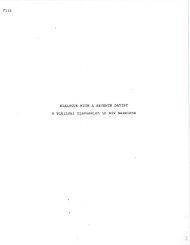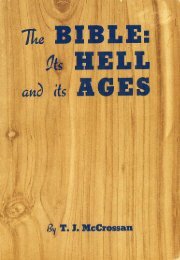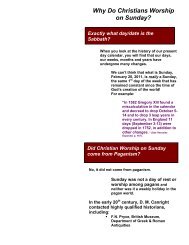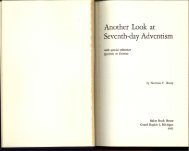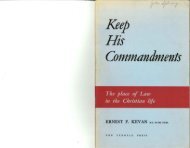Discovering the New Covenant by Greg Taylor - exAdventist Outreach
Discovering the New Covenant by Greg Taylor - exAdventist Outreach
Discovering the New Covenant by Greg Taylor - exAdventist Outreach
Create successful ePaper yourself
Turn your PDF publications into a flip-book with our unique Google optimized e-Paper software.
WHAT ABOUT SUNDAY?<br />
not. They gave <strong>the</strong> reasons that we have previously<br />
discussed. Clearly, <strong>the</strong>y understood <strong>the</strong> teachings of Paul and<br />
<strong>the</strong> rest of <strong>the</strong> Bible as we have just studied. The Sabbath<br />
was a permissible option, but not binding on Christians.<br />
However, <strong>the</strong>re was a need to ga<strong>the</strong>r for corporate worship.<br />
Because many of <strong>the</strong> Jewish Christians would still attend<br />
synagogue on <strong>the</strong> Sabbath, <strong>the</strong>re was a need to set aside<br />
ano<strong>the</strong>r time when o<strong>the</strong>r Christians, including <strong>the</strong> Gentile<br />
Christians, could ga<strong>the</strong>r for <strong>the</strong>ir own private meetings. This<br />
became Sunday. Our first record of this reference was in 107<br />
AD. That is only 11 years from <strong>the</strong> time of John’s reference<br />
to <strong>the</strong> Lord's day in Revelation 1:10 It is quite probable that<br />
John was referring to Sunday when he mentioned that day—<br />
not because of any sacredness attached to it, but because it<br />
was <strong>the</strong> common meeting day for Christians. 2<br />
In 140 A.D. Justin Martyr held a detailed dialogue with<br />
Trypho, a Jewish critic of <strong>the</strong> Christians. In this debate he<br />
explains why <strong>the</strong> Christians do not observe any Sabbaths. He<br />
refers specifically to <strong>the</strong> Pauline Scriptures we have<br />
examined in this book. His arguments were based on <strong>the</strong><br />
fulfillment of <strong>the</strong> Law in Christ, specifically <strong>the</strong> Sabbath.<br />
This detailed <strong>the</strong>ological explanation to a Jewish critic<br />
clearly demonstrates how <strong>the</strong> early Christians believed. He<br />
was writing from <strong>the</strong> city of Ephesus where John had been<br />
<strong>the</strong> pastor/leader. This discussion took place only 44 years<br />
after <strong>the</strong> death of <strong>the</strong> Apostle and demonstrates what he<br />
considers to be <strong>the</strong> universal understanding of Christians at<br />
that time. 3 The idea that Sabbath was changed from Saturday<br />
to Sunday <strong>by</strong> <strong>the</strong> Catholic Church in later years is not borne<br />
out <strong>by</strong> <strong>the</strong> historical record.<br />
The early Christians had some sentimental attachment to<br />
<strong>the</strong> first day of <strong>the</strong> week as well. Not only did <strong>the</strong> Lord rise<br />
on that day, but of <strong>the</strong> seven appearances of Jesus to his<br />
2 H. M. Riggle, Sabbath and <strong>the</strong> Lord’s Day, (Glendale AZ: Life<br />
Assurance Ministries) pp. 114-135.<br />
3 Ibid. pp 121-130.<br />
133



